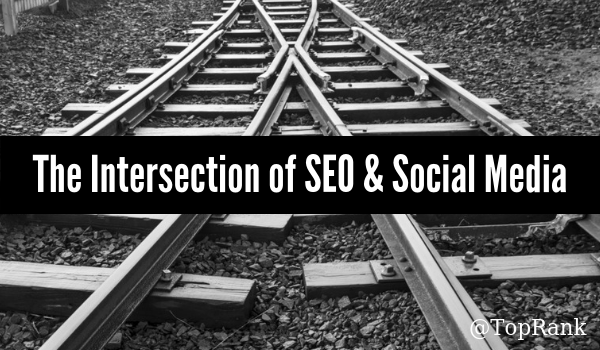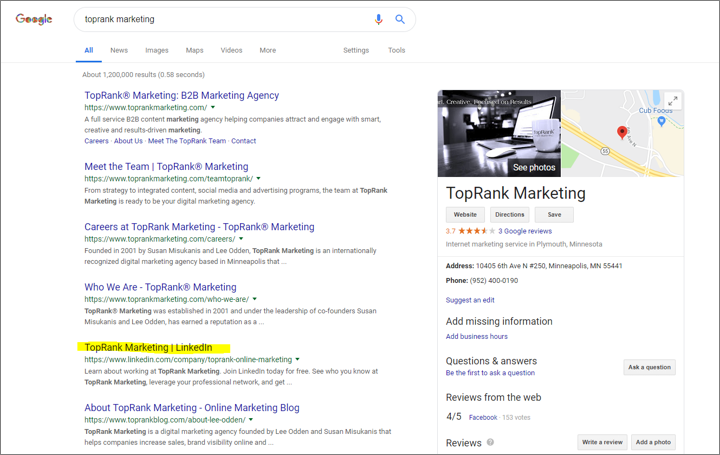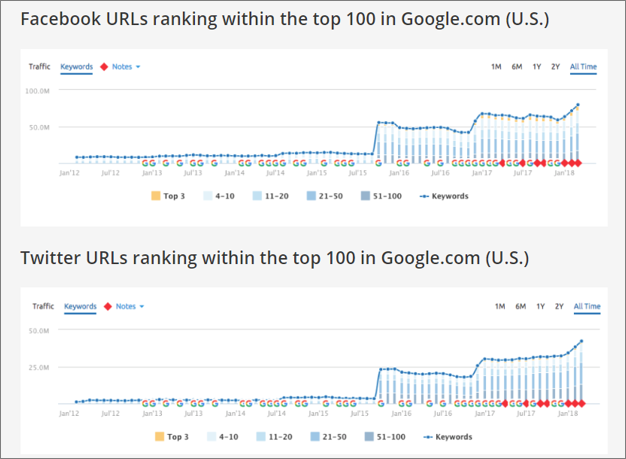
 Social media marketing and search engine optimization are often viewed as two disparate components of a holistic digital strategy. In some ways, they are distinct, but there is far more convergence and crossover than we’re often led to believe. I find that looking at one side through the lens of the other invariably helps me better understand the more ambiguous aspects of each. So today I thought I’d share this perspective, with a focus on how these tactical areas can work cohesively to strengthen your brand’s visibility and impact on the web.
Social media marketing and search engine optimization are often viewed as two disparate components of a holistic digital strategy. In some ways, they are distinct, but there is far more convergence and crossover than we’re often led to believe. I find that looking at one side through the lens of the other invariably helps me better understand the more ambiguous aspects of each. So today I thought I’d share this perspective, with a focus on how these tactical areas can work cohesively to strengthen your brand’s visibility and impact on the web.
Similarities Between Social and Search
Let’s begin by exploring some commonalities between social media networks and social engines. Both are massively popular internet entry points. Google processes 3.5 billion searches every day. Nearly the same number of people (3.48 billion) are active social media users. That’s roughly half the planet’s population. These numbers, in a nutshell, illustrate why digital marketers everywhere need to account for both search and social. They’re the first places most people go when they hop online. People use both to answer questions. We all know this is the primary purpose of search engines. Whether users are typing in a literal semantic question, or simply inputting keywords in hopes of finding information, they are trying to find answers and solve problems. Social media doesn’t necessarily present the same direct question-and-answer format, but we usually log on to satisfy some type of curiosity. (What are people talking about right now? What do my friends and connections have to say about recent events? Is this dress white and gold, or black and blue?) Both are critical brand touchpoints. Two of the easiest ways for any customer to vet a company are by: A) Pulling them up in a Google search, or B) Checking out their social media accounts. It’s pretty easy to tell based on a brand’s search rankings, SERP display, and site structure whether they have a sound digital strategy. The same is true of a quick glance at their Facebook, Twitter, and LinkedIn accounts. If it’s difficult to find your company through search or social — or if you give off a poor first impression on either front — that’s an immediate credibility-crusher.Where Search and Social Can Work Together Strategically
SEO and social media marketing are fundamentally different. There are job titles, and entire companies, dedicated specifically to each. But in an integrated digital marketing strategy, it’s important to recognize where these two facets intersect and complement one another. #1: Keyword Research and Application Keywords (and extensions thereof) form the backbone of a best-answer content strategy. The intel derived from these efforts can also be applied to social media marketing. As mentioned above, people use both these channels to answer questions. With a defined understanding of which search phrases and queries are pertinent to our audiences, we can better align the content we provide. This is true on social as well. When you use the right keywords (and, in this case, hashtags) more frequently in your posts, driving conversations and engagement around them, your brand will be more likely to show up on the feeds of people interested in them. In either instance, it comes down to the same foundational crux of almost any content strategy: What do your customers want to know, and how can you deliver it? #2: Social Content Can Show Up in Search Try entering your company’s name into a Google search. What’s the first result? Hopefully your website’s homepage. The second and third might also be pages from your own domain. But very frequently, the first third-party link will be your LinkedIn Page. (See the SERP for TopRank Marketing below as a typical example.) LinkedIn* is a particularly impactful platform in this regard; search engines crawl it, so incorporating savvy SEO tactics on your company’s LinkedIn Page can actually benefit your rankings. This hasn’t been quite as true for other networks, which were once almost invisible to Google, but research from HootSuite did find a dramatic increase in the appearance of Facebook and Twitter content in SERPS starting in late 2015:
LinkedIn* is a particularly impactful platform in this regard; search engines crawl it, so incorporating savvy SEO tactics on your company’s LinkedIn Page can actually benefit your rankings. This hasn’t been quite as true for other networks, which were once almost invisible to Google, but research from HootSuite did find a dramatic increase in the appearance of Facebook and Twitter content in SERPS starting in late 2015:  “Admittedly, the majority of social links within the SERPs appear for branded search terms, but this should not be discounted,” writes Simon Ensor at Search Engine Watch. “If we are in fact looking at marketing as a more holistic practice in the digital age, then we have to ensure that your branded search terms result in high click-through rates from search.” #3: Social Signals (Indirectly) Affect Search It’s been a hotly debated topic in the digital marketing world. Google has claimed for years that social signals are not a ranking factor. Yet, HootSuite’s experimentation found that “there appears to be a strong correlation between social activity and rankings.” Another study last year from Searchmetrics reached the same conclusion. We still don’t have complete clarity around this relationship, which would earn a Facebook status of “It’s complicated.” Although we don’t believe social signals directly impact search rankings, there is definitely a correlation, which is widely attributed to the byproducts of highly successful social content. As Sharon Hurley Hall puts it, “Social media may not be a ranking factor for Google, but it can amplify the ranking factors that Google DOES consider.” In other words, when a link to your content gains traction on social media, it tends to gain more general prominence: pageviews, backlinks, brand authority, etc. This, in turn, helps the page earn more visibility in the eyes of Google. The key is simply getting people to click through on those links, which brings us to the final point of convergence. #4: Compelling Clicks is Crucial Search engine optimization today isn’t so much about keyword-stuffing; Google is too smart to be gamed by it. The engine’s sole mission is to deliver the most satisfactory results for a given query, meaning it will weigh click-throughs and time on page more heavily than text arrangement. That’s why an irresistible headline and meta description are so vital to SERP success. This is also at the heart of social media marketing. In a sea of competing ephemeral content, you’ve really gotta stand out to capture someone’s attention and compel a click. (Especially since social media networks, unlike search engines, aren’t all that interested in sending users over to your website, so the algorithms will often work against you for outbound links.) If you find a particular angle or message is especially resonant on social platforms (even if just for driving engagement, not clicks), you might consider adopting it for your meta descriptions to see if it improves CTRs, and vice versa.
“Admittedly, the majority of social links within the SERPs appear for branded search terms, but this should not be discounted,” writes Simon Ensor at Search Engine Watch. “If we are in fact looking at marketing as a more holistic practice in the digital age, then we have to ensure that your branded search terms result in high click-through rates from search.” #3: Social Signals (Indirectly) Affect Search It’s been a hotly debated topic in the digital marketing world. Google has claimed for years that social signals are not a ranking factor. Yet, HootSuite’s experimentation found that “there appears to be a strong correlation between social activity and rankings.” Another study last year from Searchmetrics reached the same conclusion. We still don’t have complete clarity around this relationship, which would earn a Facebook status of “It’s complicated.” Although we don’t believe social signals directly impact search rankings, there is definitely a correlation, which is widely attributed to the byproducts of highly successful social content. As Sharon Hurley Hall puts it, “Social media may not be a ranking factor for Google, but it can amplify the ranking factors that Google DOES consider.” In other words, when a link to your content gains traction on social media, it tends to gain more general prominence: pageviews, backlinks, brand authority, etc. This, in turn, helps the page earn more visibility in the eyes of Google. The key is simply getting people to click through on those links, which brings us to the final point of convergence. #4: Compelling Clicks is Crucial Search engine optimization today isn’t so much about keyword-stuffing; Google is too smart to be gamed by it. The engine’s sole mission is to deliver the most satisfactory results for a given query, meaning it will weigh click-throughs and time on page more heavily than text arrangement. That’s why an irresistible headline and meta description are so vital to SERP success. This is also at the heart of social media marketing. In a sea of competing ephemeral content, you’ve really gotta stand out to capture someone’s attention and compel a click. (Especially since social media networks, unlike search engines, aren’t all that interested in sending users over to your website, so the algorithms will often work against you for outbound links.) If you find a particular angle or message is especially resonant on social platforms (even if just for driving engagement, not clicks), you might consider adopting it for your meta descriptions to see if it improves CTRs, and vice versa.
Social and SEO: Two Keys to the Content Kingdom
These are separate tactical areas of digital marketing, but to treat them as completely independent would be a mistake. At TopRank Marketing, we view SEO and social media marketing as two complementary aspects of a fully integrated content marketing strategy, with numerous functional similarities and intersectional opportunities. Understanding how to maximize both in unison is instrumental to unleashing your brand’s full potential. Want to learn more about how different tactics can work together harmoniously in today’s digital strategies? Check out our recent post from Caitlin on The Intersection of SEO & Influencer Marketing: What B2B Marketers Need to Know. * Disclosure: LinkedIn is a TopRank Marketing clientThe post The Relationship Between SEO and Social: It’s Complicated … and Complimentary appeared first on Online Marketing Blog - TopRank®.
Article Source: http://bathseoexpert.blogspot.com/2019/06/the-relationship-between-seo-and-social.html
No comments:
Post a Comment